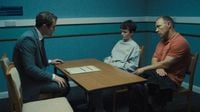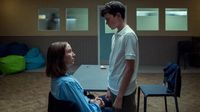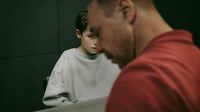If you thought living through adolescence was hard, Netflix is here to remind you that kids today have it even tougher. The British miniseries “Adolescence” premiered on March 13, 2025, and has quickly taken the cultural conversation by storm, boasting an impressive 24.3 million views in its first four days.
This four-episode series stars Owen Cooper in a powerful acting debut as Jamie Miller, a 13-year-old boy arrested on suspicion of murder after one of his classmates is found fatally stabbed. Alongside Cooper, Stephen Graham and Christine Tremarco play Jamie's parents, making the narrative a harrowing exploration of contemporary youth culture.
What unfolds in “Adolescence” resembles a stage play more than a typical miniseries. The show's executive producer, Jack Thorne, who co-wrote the script, places emphasis on intimate storytelling. One episode revolves around a conversation between Jamie and a child psychologist tasked with uncovering the underlying motive behind the crime: Why did this happen? As CNN summarizes, "Adolescence asks viewers to bear witness" to the tension and trauma that permeates youth lives in an age of social media and rampant misinformation.
Unlike traditional prestige thrillers that rely on relentless twists or dramatic moments, “Adolescence” builds its tension through careful narrative spaces. This unflinching approach forces viewers to confront uncomfortable truths about today's youth and societal pressures.
Adding to the unique experience of watching “Adolescence” is its audacious filming technique, with each hour-long episode shot in one continuous take. Director Philip Barantini and Graham teamed up again after their collaboration on “Boiling Point” to create this ambitious project, aiming to foster an immersive viewing experience. "If you can't see the joins, it's because there aren't any," stated Netflix during a Q&A on the show's technical achievements, emphasizing the seamless execution of the filming process.
To capture the reality of a school environment filled with both friends and bullies, the production employed cutting-edge techniques. Behind the scenes, rigorous rehearsal processes ensured that the complexities of the choreography were accurately implemented. Barantini himself explained the immense planning required: "It's a lot of preparation... we mapped the area we were using and looked at how the camera would move within it. We rehearsed it like a dance." The scale of this production extends to scenes involving nearly 400 extras in some episodes, showcasing the logistical triumphs of bringing this story to life.
Cooper's performance has prompted widespread praise, particularly given that he has no prior acting experience. Barantini noted, "Owen didn’t do that in any of the other takes," reflecting on a memorable moment in which Cooper spontaneously yawned, triggering an unexpected but brilliant response from his co-star. This unscripted event emerged as a turning point in the scene, illustrating how the cast’s natural interactions bolstered the narrative's authenticity.
Cooper plays off Erin Doherty, who stars as child psychologist Briony, during a pivotal episode that examines the psychological facets of Jamie's character. The dynamic between them is palpable, particularly as the show tackles heavy thematic elements concerning the effects of social media. "It’s there, we can’t deny it... but I don’t actually think the show poses any answers," Doherty expressed, underscoring that the series illuminates pressing societal issues without oversimplifying them.
Throughout “Adolescence,” the exploration of Jamie’s radicalization through online interactions highlights a dark facet of modern youth culture. References to incel ideology and figures like Andrew Tate embed the show within contemporary discussions around male rage and societal impact. As the characters face fears regarding their children’s exposure to these damaging influences, the anxiety of modern parenting resonates deeply with audiences. Graham and Tremarco's parental roles force viewers to contemplate, "What if your child's ideologies were manipulated by creators you can't police?" This grappling with accountability and the harrowing consequences leads to an urgent conversation about parental responsibilities amid evolving cultural landscapes.
As the four-part miniseries continues to receive accolades and captures the attention of audiences across the globe, it remains a poignant commentary on the intricacies of adolescence in the internet age. “Adolescence” stands as an emotionally charged reminder of how hidden dangers can escalate and necessitates deeper awareness among parents and mentors.
In the end, what strategies can be employed to navigate this challenging landscape? The overarching message articulated through “Adolescence” effectively urges conversations around difficult subjects that many may shy away from. Reflecting on the insights of those involved, it becomes apparent that the dialogue on youth and their vast experiences in today’s society is more vital than ever.









